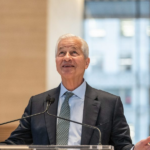Governing Council member Mario Centeno has cautioned the European Central Bank (ECB) against allowing inflation to fall below its 2% target, signaling his openness to potential interest rate reductions sooner than his colleagues. In an interview with Bloomberg Television on Tuesday, the Portuguese official emphasized the need to maintain a policy trajectory that aligns with achieving the 2% inflation goal.
Centeno, speaking at Davos, noted that consumer price growth has significantly undershot expectations, and the 20-nation euro-zone economy has been grappling with challenges for over a year, with the current quarter also expected to be demanding.

Despite a recent uptick in price gains, Centeno stressed the importance of achieving the 2% inflation target in the medium term, stating, “It’s not in February, it’s not March — it’s the medium term.”
Centeno’s stance differs from many ECB policymakers, as he has suggested the possibility of monetary easing starting before mid-year. Most of his colleagues prefer to wait for crucial wage data, expected around May, making June the earliest meeting for potential adjustments to the deposit rate, currently at 4%.
While Bundesbank President Joachim Nagel mentioned that summer could be an appropriate time to consider lowering borrowing costs, Austrian counterpart Robert Holzmann raised the prospect of no rate cuts in 2024, citing geopolitical tensions.
Centeno downplayed concerns about declining real wages, expressing confidence in a gradual catch-up over time. He stated, “Wage developments in Europe will be compatible with lower price pressures.”
Investors are anticipating six quarter-point rate reductions in 2024, starting in April, while economists in a recent Bloomberg poll predict four, beginning in June.
Euro-zone inflation rose to 2.9% in December from the previous month’s 2.4%, but expectations suggest ongoing disinflation throughout 2024. An ECB survey indicated consumers’ inflation expectations are at their lowest in over 1 1/2 years.
Centeno emphasized that decisions would be based on incoming economic data, stating, “We are data-dependent — we are not calendar dependent. We need to remain data-dependent so we remain credible.”









